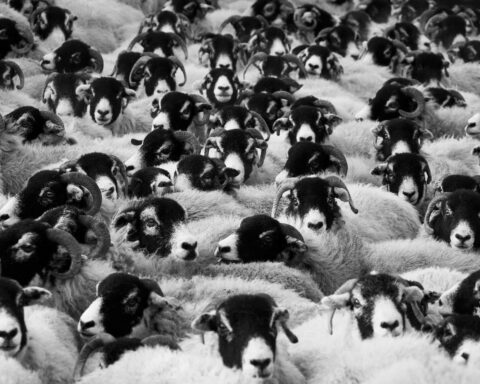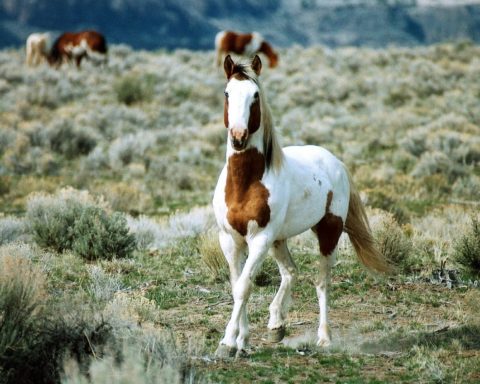By Abolition for a Better Society
In this talk given by Anoushavan Sarukhanya at the International Animal Rights Conference 2014, it is proposed that asking people to vegan is not a strong claim which will move us closer to animal liberation. Anoushavan shares some statistics — these show that almost all exploitation of nonhuman animals is exploitation for “food” (over 99%). Anoushavan suggests the focus of the vegan/animal liberation movement should be on the animals-as-food industry. Anoushavan looks into the problems with the vegan conversion approach and encourages us to make a stronger claim which creates a public debate that leads to abolition.
Below is a summary of the talk (with some paraphrasing and small additions).
Making a Claim
Social movements are “claim making machines”. They make a claim, then make that claim visible in society. The more visible this claim becomes, the more the issue becomes a “public problem”. This problem is debated in the public sphere until political action is taken. All social movements begin with a small minority of people, who begin making the claim. Although we might think a minority can’t bring about change, it is when the unanimity of a practice is broken that it becomes easier for other people to also begin making the claim, so the movement and the call for change grows. Let’s apply this to the vegan/animal liberation movement:
Almost everyone eats nonhuman animals (and/or their secrections). However, a small minority of people believe this is wrong and make a claim that challenges this practice. This creates a fracture in the normality of eating nonhuman animals, which then leads to a debate on the practice.
To summarise the claim making process:
- Make the claim
- Public debate
- The issue becomes a political problem for society, due to the public debate around the issue
- Action is taken to address the issue (by politicians, governments etc).
Why do most people eat nonhuman animals?
Have you ever heard the saying “Most people eat meat because most people eat meat”? Most people conform to the norms of society. Anoushavan refers to the conformity experiments of Solomon Asch. These prove that most people go along with the majority, even if they think that the majority might be wrong. Put ten people in a room. Nine of them are actors. One of them is the test subject. The nine actors all choose the wrong answer. The test subject, more often than not, also chooses the wrong answer, even if they know it’s wrong. Why? Because people conform to the majority view. This is because they either think the group has more information about the situation than they do, or because they don’t want to be the outsider.
What claim does the vegan/animal liberation movement make? Generally, it is “go vegan”, or some variation on that theme. The aim of the movement is to convert people to veganism. The thinking underpinning the conversion approach is that because vegans are a minority, we need to create more vegans. Once we have more/enough vegans, we can make a bigger ask such as: close all slaughterhouses now, for example. Veganism is, in practice, a boycott. Other social movements have used boycotts as a tactic. During the struggle for Indian independence, there was a boycott of British textiles. However, the claim was: we want an independent India. The boycott was just one tactic that was used. The problem with veganism is, it is both a boycott and the claim.
Abolition is a stronger approach than “Go Vegan“
Anoushavan suggests that a call for abolition is a better move than the vegan conversion approach. People always prefer the course of action that completely eradicates the problem, instead of treating the symptoms of a problem.
The Proportion Dominance Effect provides evidence for this. An example given by Anoushavan is:
Two industries are polluting a river. Two solutions are offered:
- Stop Industry A and save 245 fishes out of 350.
- Or, stop Industry B, and save 251 out of 980 fishes.
The preferred solution, for most people, was option 1., to stop Industry A. Ultimately, less fishes lives are saved, but the problem seems to be effectively resolved. This, even though choosing the second option would save 6 more fishes lives. Now, think of numbers when you ask people to go vegan. Do you tell people how many billions of nonhuman animals are killed each year? Do you expect that telling them these numbers will shock them into taking action (the action = go vegan)? We tell people if they stop eating nonhuman animals, they will be helping to solve the problem. Except, the Proportion Dominance Effect shows that they will be less likely to think their actions will have an impact. They know there will still be billions of animals killed each year, even if they personally “save” 100 animal lives a year by going vegan. Anoushavan says we need to reframe our claim. A more persuasive claim would be to tell people that veganism is a global boycott with the aim of abolishing nonhuman animal exploitation. People would not then think of veganism as just their own personal choice, but as a boycott with the goal of abolition. A political project.
Vegan conversion is not efficient
The vegan conversion approach comes across as a matter of personal choice, not justice for nonhuman animals. It doesn’t create the right debate in society. When our ask is “go vegan”, we end up talking about consumption: our dietary/lifestyle preferences, the practicalities of going vegan, and vegan purity (how vegan are you? what type of vegan are you?). Vegan conversion is also incredibly slow. Other social movements didn’t use the conversion approach, but it is an approach that religions use. Christians have been converting people to Christianity for thousands of years, but not everyone in the world is Christian yet. How many thousands of years do we need to wait before the world goes vegan? Anoushavan concludes from this that the conversion approach is inefficient.
How do we make our claim for abolition then? Anoushavan makes some suggestions. When asked why we don’t eat nonhuman animals, we should say: “I am for the abolition of animal exploitation” or “I am boycotting animal exploitation”. These express the claim that we are asking for a change in society, not just a making a personal choice. During the campaign to abolish the Transatlantic Slave Trade, the majority of abolitionists did not focus on their own purity. Some did boycott the products of slavery, but even their claim was still: abolish the slave trade. Their claim was not: be like me and boycott the products of slavery.
Anoushavan also believes that when we speak about health and environment in relation to veganism, we take the focus off speciesism. In the public mind, this reduces the impact of the ethical case for justice for nonhuman animals.
Vegan claim making is morally unacceptable
Anoushavan considers the vegan conversion approach to be morally unacceptable. Repeat: the claim of the vegan/animal liberation movement is not morally acceptable. Anoushavan gives some examples of vegan claimsmaking: “Go vegan”; “Veganism is good for the planet”; “Going vegan is good for your health”. These claims are failing the victims. Anoushavan uses the example of human concentration camps. If we said: boycott the products of the concentration camps, that would not be morally acceptable. We should be calling for the abolition of those concentration camps. Anoushavan suggests the stronger claims, which people will respond to more seriously, as they highlight injustice, could be: “Close slaughterhouses now”; “Abolish the property status of animals”; “Society must fight and condemn speciesism just as it fights racism and sexism”. In conclusion, Anoushava says we have to be sure that our message is understood as a demand for a change in our society.
Response to the talk
It is true that the “go vegan” claim is not very powerful or effective. We need a strong, clear anti-speciesist abolition message. Overall, the movement needs a better claim.
I disagree that the focus should be on animals-used-as-food. Yes, it makes sense to focus on an industry that is exploiting trillions of nonhuman animals. If you take down animal ag, you halt the exploitation and slaughter of trillions of lives. However, I think as we are trying to change the way humans perceive their relationships with nonhuman animals, we should also continue to campaign against the use of nonhuman animals used in the fur industry and vivisection (and other uses like “pets” and those who are hunted). We want people to understand speciesism and unlearn their own human supremacy. I think we need to challenge people on all the uses of nonhuman animals. This way, we present a coherent message that is against all use. I don’t think we lose anything by doing this, although each group or organisation needs to think carefully about which campaigns they allocate their resources to.
I don’t agree with Anoushavan saying that we shouldn’t include environmental activism within our approach. Anoushavan uses a human concentration camp analogy: Would we say — stop putting people in concentration camps, or — the bodies of the dead are polluting the river, so we need to stop the pollution? Anoushavan sees the latter ask as shifting the focus away from the victims and being more concerned about our own survival. In that example, it does. But we must take an anti-oppression approach to our advocacy. Climate justice is inextricably entwined with justice for nonhuman animals. We can’t simply isolate the animal part of the problem. It sends us down the path of single issue campaigning and the ineffective and dangerous “animals only” rhetoric that has become so prevalent in the vegan movement.
I agree with Anoushavan that the “go vegan” claim is weak. I think there’s a lot we need to unpack about the vegan persona. It has a lot of power to it, for sure. Morally, going vegan is clearly the right thing to do. But following a vegan philosophy should also be a political statement. In the UK, at least, veganism is on its way to being legally recognised as a belief.
Perhaps if people start seeing veganism as something that needs to be taken seriously, they’ll stop seeing it as something to be derided. A 2015 study showed that vegetarians and vegans in “Western society” — but particularly vegans — face discrimination and bias on a par with other minorities.
However, even if veganism comes to be seen a personal belief to be considered seriously, that doesn’t necessarily lead to it being seen as a political movement.
I think the concept of “converting” people to veganism to build public support is misguided, as it works on the basis that we need to reach a tipping point. The approach is: a certain amount of people need to be vegan, before we can then ask for legal changes or, more radically, entire system change.
There is evidence to show that a tipping point occurs at 25%
Currently, 1 to 3% of the UK population are vegan. To reach the tipping point, we need to add another 22% to that. So, we need at least another 14 million vegans. Think about what that means. We need to get 14 million people to drastically alter their lifestyle. We often hear: going vegan is easy. Well, it seems easy once you’ve been vegan for a while. But it’s not just a diet change, there’s a whole lot of psychological and social reconfiguring that people need to undertake.
Another fundamental belief of the vegan conversion approach is that once we reach the tipping point, the demand for plant based food options will be so significant that industry will rapidly start shifting their production to plant based food. This is the classic “supply and demand” logic of the vegan influencers. Plant based capitalism. There’s definitely something to be said for making plant based food normalised and accessible. And the more public support we have, the easier it will be to call for system change. But I think our vegan heroes haven’t taken the time to consider how complex changing social norms can be.
Of course, a big lynchpin of this capitalist approach is that once veganism isn’t seen as weird or fringe, more people will feel comfortable enough to ask for the vegan option. There’s really no need for this, as already, in the UK at least, 92% of plant-based meals are eaten by non-vegans.
So, what are the norms we’re trying to change by getting people to “go vegan” (if it’s already normal for meat eaters to eat plant based sometimes)? How many vegans do we need before KFC and Burger King decide to go fully plant based? Because even if we reach the 25% tipping point, these corporates could keep supplying both flesh and plants. 75% of their customers will still be meat eaters. Advocating for plant based options won’t necessarily bring about the social change needed — that is, moving people towards an anti-speciesist mindset and challenging human supremacy.
We’re a long way off real industry change using the “supply and demand” theory.
We need to make political demands. Veganism is, and always has been, a political movement (Dr Roger Yates blog is a good place to start learning about this history).
There is already public support for the ethics underpinning veganism: most meat eaters support veganism as ethical and good for the environment. And 47% of Americans support a ban on slaughterhouses.
It sounds bizarre, yes. But, people are more willing to support a cause where they can shift their own guilt on to the “bad guy” than make personal changes. It’s easier to blame “the system” than accept that you’re part of the problem and have to change.
We need to be real change makers. We need a strong claim that the public will get behind. We don’t have time to wait for x amount of people to go vegan. We will, of course, advocate for veganism as part of our abolitionist claim. The way I see it, the action is also the education. A smart strategy would build public education into the action. This pretty much happens anyway — a direct action will consist of a press release, maybe an op-ed, interviews with activists, social media streaming. But how often is the public outreach side of things carried on after the action? How often do we deeply engage with the public on the issues raised? Often, we’ll see angry vegans guilt tripping the nonvegans on social media. It’s a public debate, sure, but how well are we managing it? Is there a communications plan in place to get the best results from the media and public response to the action?
If we talk about veganism, we open up this box full of ideas and it can go in various directions. Very often the conversation goes down the road of plant based options, health myths, personal purity, and the messenger being ignored or disparaged due to do-gooder derogation. We’re giving people multiple ways to escape the real issue.
However, a call to abolish slaughterhouses (for example), centres the political message. It says: this is about the tools of the system. It says: here’s a tool that must be dealt with by society, not just by some do-gooders opting out of that system. It retains a political focus; it’s easier to stay on message.
We need to ask for what we really want. We want abolition. I’m not too concerned at this stage about what type of abolition we should be asking for. I mean the specifics of the claim, as that depends on an exploration of what our strategic goals might be. It may also be different claims for different cultures and contexts.
In this, I hope to explain how the scope of abolitionism within the animal liberation movement must include calls normally associated with other movements: abolition of police, abolition of prisons, abolition of the state, abolition of hierarchy. Ultimately, the abolition of power. For now, we need to think a lot more about how we get society on board with something like that, instead of how we can get a large amount of people to start buying different things at the supermarket.
Abolition for a Better Society is a research based approach to abolitionism. To read more by them, visit their Medium page.
If you enjoyed reading this, help support us by sharing it with others.




